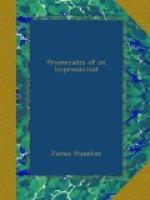He was born at Namur, Belgium, July 10, 1833, and died at Essonnes, near Paris, August 23,1898. He was the son of wealthy parents, and on one side stemmed directly from Hungary. His grandfather was Rops Lajos, of the province called Alfod. The Maygar predominated. He was as proud and fierce as Goya. A fighter from the beginning, still in warrior’s harness at the close, when, “cardiac and impenitent,” as he put it, he died of heart trouble. He received at the hands of the Jesuits a classical education. A Latinist, he was erudite as were few of his artistic contemporaries. The mystic strain in him did not betray itself until his third period. He was an accomplished humourist and could generally cap Latin verses with D’Aurevilly or Huysmans. Tertullian’s De Cultu Feminarum he must have read, for many of his plates are illustrations of the learned Bishop of Carthage’s attitude toward womankind. The hot crossings of blood, Belgian and Hungarian, may be responsible for a peculiarly forceful, rebellious, sensual, and boisterous temperament.
Doubtless the three stadia of an artist’s career are the arbitrary classification of critics; nevertheless they are well marked in many cases. Balzac was a romantic, a realist, a mystic; Flaubert was alternately romantic and realist. Tolstoi was never a romantic, but a realist he was, and he is a mystic. Dostoievski, from whom he absorbed so much, taught him the formulas of his mysticism—though Tolstoi has never felt the life of the soul so profoundly as this predecessor. Ibsen passed through the three stages. Huysmans, never romantic, began as a realistic pessimist and ended as a pessimistic mystic. Felicien Rops could never have been a romantic, though the macabre romanticism of 1830 may be found in his designs. A realist, brutal, bitter, he was in his youth; he saw the grosser facts of life, so often lamentable and tender, in the spirit of a Voltaire doubled by a Rabelais. There is honest and also shocking laughter in these early illustrations. A fantaisiste, graceful, delicate—and indelicate—emerged after the lad went up to Paris, as if he had stepped out of the eighteenth century. Rops summed up in his book plates, title-pages, and wood-cuts, illustrations done in a furious speed, all the elegance, the courtly corruption, and Boucher-like luxuriousness that may be detected in the moral marquetrie of the Goncourts. He had not yet said, “Evil, be thou my Good,” nor had the mystic delirium of the last period set in. All his afternoons must have been those of a faun—a faun who with impeccable solicitude put on paper what he saw in the heart of the bosk or down by the banks of secret rivers. The sad turpitudes, the casuistry of concupiscence, the ironic discolourations and feverish delving into subterranean moral stratifications were as yet afar. He was young, handsome, with a lithe, vigorous body and the head of an aristocratic Mephistopheles, a head all profile, like the heads of Hungary—Hungary




